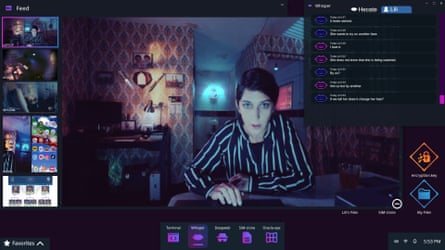The Cannes film festival isn’t typically associated with video games, but this year it’s playing host to an unusual collaboration. Lili is a co-production between the New York-based game studio iNK Stories (creator of 1979 Revolution: Black Friday, about a photojournalist in Iran) and the Royal Shakespeare Company, and it’s been turning heads with its eye-catching translocation of Macbeth to modern-day Iran.
“It’s been such an incredible coup to have it as the first video game experience at Cannes,” says iNK Stories co-founder Vassiliki Khonsari. “People have gone in saying, I’m not familiar playing games, so I may just try it out for five minutes. […] But then once they’re in, there is this growing sense of empowerment that people from the film world are feeling.”
The Cannes festival’s Immersive Competition began in 2024, although the lineup doesn’t usually feature traditional video games. “VR films and projection mapping is the thrust of it,” says iNK Stories’ other co-founder, Vassiliki’s husband Navid Khonsari. But Lili weaves live-action footage with video game mechanics in a similar way to a game such as Telling Lies or Immortality. Its lead, Zar Amir Ebrahimi, won best actress at Cannes three years ago.
Lili focuses on the story of Lady Macbeth, here cast as the ambitious wife of an upwardly mobile officer in the Basij (a paramilitary volunteer militia within the Islamic Revolutionary Guard in Iran). As in the play, she plots a murder to secure her husband’s rise. “I think that the narrative of Lady Macbeth is that she’s manipulative, and that’s exactly what got us interested,” says Navid.
“The social limitations based on her gender forced her to try to attain whatever leadership role she can,” he continues. “If she was a man, she would have been one of the greatest kings that country would have ever experienced, but because she was a woman she had to work within the structure that was there for her. And I think this is the same thing that we have with our Lili character: because of society, she’s limited to how high she can rise.”
The player is cast as a member of the Hecate Web, a group of hackers who stand in for Macbeth’s witches, and you begin by accessing Lili’s phone and computer, watching her on CCTV cameras inside her home. The oppression of surveillance and censorship is a key theme. At one point Lili tries to access a YouTube makeup tutorial, only to be blocked by the state’s firewall. The fact that the player takes on an uncomfortable voyeuristic role is intentional. “We’re all part of the problem when it comes to surveillance, when it comes to looking at each other, spying on each other,” says Navid.

You can bypass it to give her access, however, prompting a memorable scene in which she wraps her head in clingfilm before applying eyeliner and lipstick. “That is her ritual, applying makeup in a world that she cannot do that [in], without her husband knowing or anyone else knowing,” says Vassiliki. “We love it as this sort of allegory, that she’s suffocating in the world and in the various layers of masks that she must put on herself … our Lady Macbeth, our Lili, has an awakening, and all of those tools that we’ve used to hack her become tools that we actually give her to help her take the system down from within.”
Lili is scheduled for release in late 2026, and the RSC’s Sarah Ellis says that it might well be turned into a play at some point in the future. Navid says there are already plans for a film version, using some of the same footage shot for the game – a reminder that the boundaries between the worlds of gaming, movies and theatre are increasingly porous. This is unlikely to be the last time the RSC is involved in games.
“I was always interested in games, and the convergence of games and theatre in particular,” says Ellis, who originally approached iNK with the idea for this collaboration. “We’ve worked with some of the best Shakespeare scholars … Professor Emma Smith from Oxford has been an absolute keystone in the dramaturgy of this work,” says Ellis. Smith has said that if Shakespeare were alive today, he’d be writing for games, and Ellis agrees: “He was an innovator.”

 3 months ago
154
3 months ago
154

















































